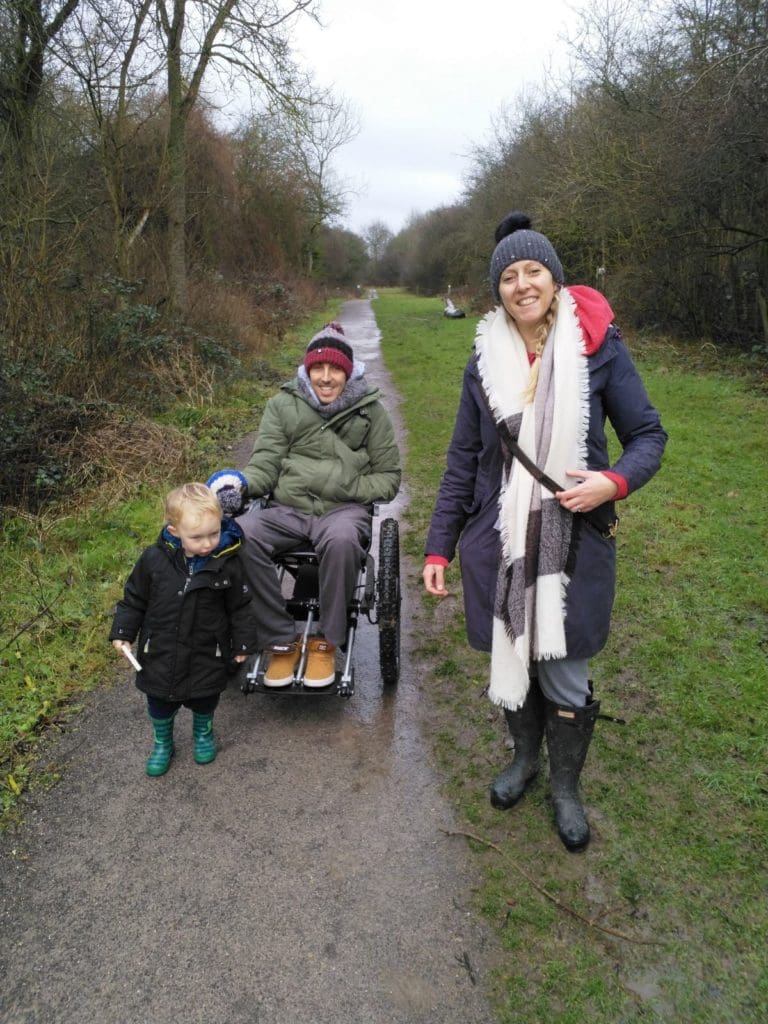Staying healthy with a high-level injury
5 April 2018

For many people, maintaining a healthy lifestyle is a key part of our daily lives. When someone sustains a spinal cord injury, they often develop new ways of healthy living. We spoke to some of our staff members, Luke, Andy, Ella and Chris, who all have a high level spinal cord injury and limited arm and hand function. They shared their tips and experiences around what they do to stay healthy and active that may or may not be useful for you.
Simple techniques and exercises
- “I can’t lift my fingers towards my shoulders so I use a tenodesis grip where I flex my wrist up to make my fingers close. This means I can grasp and release objects without having to consciously move my fingers. I also do a lot of things two-handed.”
- “I make sure that my hands are kept in a way that I can straighten my fingers if I need to. When my hands are at rest, my fingers curl. I make sure I stretch them out on my lap or on the table. I avoid them locking into fists by applying gentle pressure on the back of my knuckles and fingers. Though I don’t want to do it too much or else I’ll lose my grip.”
- “If you’ve got the mobility to move your arms or shoulders, do what you can. Don’t be embarrassed to flail your arms about as it gets your heart rate up – I sometimes do that when my wife is doing her aerobic exercises. It works even if I look like a wally while doing it!”
- “I’ve got an exercise machine at home that I use. I’ve tried a few things over the years but if I need assistance using them or getting set up on them, it puts me off doing it. I don’t need any help with the machine that I’ve got and I can just go up to it and start using it.”
- “When I’m watching TV or not actually using my hands, I’ll put them on my knees and close them into a fist just for that dexterity. I’ve tried to get into that habit so that it becomes second nature.”
- “I’ve always been encouraged to lift myself in my chair because of pressure points. It helps with when I have to lift my body weight in transfers so I do it a lot when I’m watching TV.”
- “I often use resistance bands – loop the ends or find ones with handles. They are great for exercising upper limbs and can be used in a variety of ways. Or combining gripping aids like active hands with wrist weights can get the blood pumping. I’d recommend high quality resistance bands that won’t snap easily.”

Chris and his family taking a walk near their home
Getting out and about
- “I’ve started playing wheelchair rugby which is great exercise. I’ve also got a dog and take him out two or three times a day which keeps me quite fit.”
- “I realise now that I can’t eat as much as I did before. I put on quite a bit of weight when I first left the hospital. I think that’s partly to do with the fact that I was quite sporty and active before my injury so I thought I could eat the same amount that I was used to eating. I now try to control how many calories I have.”
- “A lot of people with limited hand function get into hand cycling. The hand bike was the first thing that got me to shift the pounds when I left the hospital. When I started, I couldn’t go 10 metres without having to stop because my shoulders ached so much. By the end, I completed a half marathon for Back Up in 2004!”
- “I’ve become more confident in how far I can push my chair since getting my puppy. I’ll always go with someone as he’s a bit of a handful. Before, I might have asked for a bit of help but now, the distance I can push alone has just got further.”
- “Fingerless pushing gloves are really useful for people with a high level injury. They’re easier to put on and off, increases your grip on the push rims and add some padding and protection for your hands.”
Staying motivated
- “A little is better than nothing. It’s not the same as it was before but I look at it as a new challenge.”
- “I think it’s great to find exercises and activities that will keep you happy, active and that you can sustain. The more you do it, the easier it gets.”
- “It’s important to stay healthy because it can have adverse knock-on effects further down the line.”
- “Everyone wants more than what they’ve got, it’s true of most things in life. But with your spinal cord injury, it helps to focus on what you’ve got and what you can do. That’s not to say don’t challenge yourself. Just make sure you’ve got bitesize goals and work towards achieving them.”
- “Find something that interests you, that drives you and makes you want to get up and out of bed in the morning.”
If you have questions about any of the issues raised in this piece, please contact our outreach team at outreachandsupport@backuptrust.org.uk or call us on 020 8875 1805. You can also visit our support for you section to find out more about the services we offer and how we can help.

